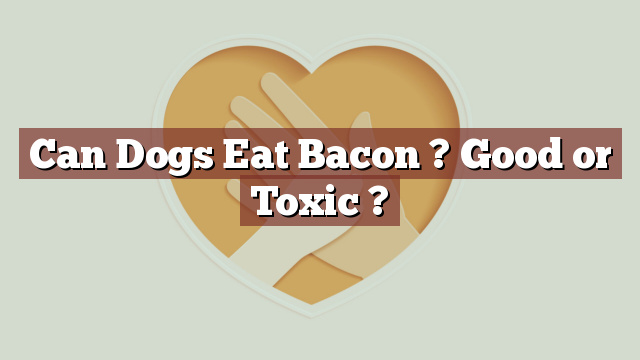Can Dogs Eat Bacon? Good or Toxic?
One of the most common questions pet owners have is whether it is safe to feed their furry friends certain human foods. While it is important to ensure that our dogs receive a balanced diet, it is equally vital to be aware of what foods can be harmful to them. Bacon, a popular breakfast food beloved by many, is often a topic of debate when it comes to dogs. In this article, we will explore the nutritional value of bacon, whether dogs can safely eat it, and the potential risks and benefits associated with feeding them this delicious treat.
Nutritional Value of Bacon: What Does it Contain?
Before delving into whether dogs can eat bacon, it is essential to understand its nutritional composition. Bacon is primarily made from pork and is high in fat, protein, and sodium. It also contains various vitamins and minerals, including vitamin B12, zinc, and selenium. However, the high fat and sodium content are aspects that need to be considered when determining if it is suitable for our canine companions.
Can Dogs Eat Bacon? Is it Safe or Toxic for Them?
No, dogs should not be fed bacon. While it may be tempting to share this savory treat with our four-legged friends, bacon can be harmful to their health. The high fat content in bacon can lead to pancreatitis, a condition characterized by inflammation of the pancreas. Additionally, the excessive sodium present in bacon can cause sodium ion poisoning, leading to symptoms such as vomiting, diarrhea, excessive thirst, and seizures. Moreover, the consumption of bacon can contribute to obesity in dogs, which can lead to numerous health issues, including joint problems, diabetes, and heart disease.
Scientific research and veterinary insights consistently advise against feeding bacon to dogs due to the potential health risks associated with it. It is important to prioritize our pets’ well-being and provide them with a balanced diet that meets their nutritional needs without compromising their health.
Potential Risks or Benefits of Feeding Dogs Bacon
While bacon can be harmful to dogs, it is essential to highlight some potential risks and benefits associated with its consumption. Feeding bacon as an occasional treat, in small quantities, may not pose an immediate danger to certain dogs. However, given the potential health risks, it is best to err on the side of caution and avoid feeding bacon to our canine companions altogether. Instead, there are various dog-friendly alternatives available that can satisfy their taste buds without risking their well-being.
My Dog Ate Bacon: What Should I Do?
If your dog has accidentally consumed bacon, the first step is to assess the situation. If your dog ingested a small amount of bacon and shows no symptoms, it is advisable to monitor them closely and ensure they have access to plenty of fresh water. However, if your dog exhibits any signs of illness, such as vomiting, diarrhea, or seizures, it is crucial to seek immediate veterinary care. The veterinarian will be able to assess your dog’s condition and provide appropriate treatment if necessary.
Conclusion: Weighing the Pros and Cons of Feeding Bacon to Dogs
In conclusion, while bacon may be a flavorful and tempting treat for both humans and dogs, it is not safe for our furry friends to consume. The high fat and sodium content, along with the potential risks of pancreatitis, sodium ion poisoning, and obesity, make it advisable to avoid feeding bacon to dogs altogether. It is crucial to prioritize our dogs’ health and well-being by offering them a balanced and appropriate diet specifically formulated for their needs. If you have any doubts or concerns about your dog’s diet or if they have consumed bacon and are showing signs of illness, it is always best to consult with a veterinarian for professional guidance and advice. Remember, a healthy and happy dog is worth more than a tasty treat.
Thank you for investing your time in exploring [page_title] on Can-Eat.org. Our goal is to provide readers like you with thorough and reliable information about various dietary topics. Each article, including [page_title], stems from diligent research and a passion for understanding the nuances of our food choices. We believe that knowledge is a vital step towards making informed and healthy decisions. However, while "[page_title]" sheds light on its specific topic, it's crucial to remember that everyone's body reacts differently to foods and dietary changes. What might be beneficial for one person could have different effects on another. Before you consider integrating suggestions or insights from "[page_title]" into your diet, it's always wise to consult with a nutritionist or healthcare professional. Their specialized knowledge ensures that you're making choices best suited to your individual health needs. As you navigate [page_title], be mindful of potential allergies, intolerances, or unique dietary requirements you may have. No singular article can capture the vast diversity of human health, and individualized guidance is invaluable. The content provided in [page_title] serves as a general guide. It is not, by any means, a substitute for personalized medical or nutritional advice. Your health should always be the top priority, and professional guidance is the best path forward. In your journey towards a balanced and nutritious lifestyle, we hope that [page_title] serves as a helpful stepping stone. Remember, informed decisions lead to healthier outcomes. Thank you for trusting Can-Eat.org. Continue exploring, learning, and prioritizing your health. Cheers to a well-informed and healthier future!

